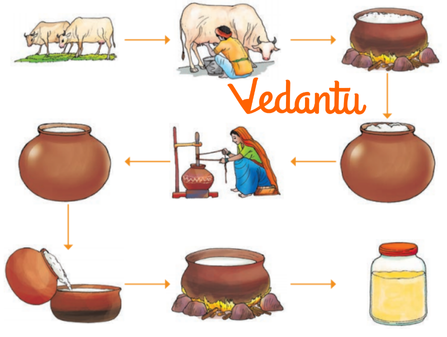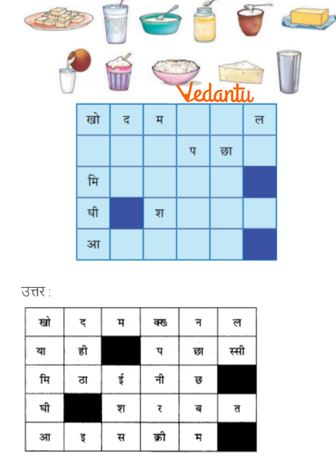NCERT Solutions for Hindi Class 6 Chapter 9 Maiya Main Nahin Makhan Khayo - FREE PDF Download
FAQs on Maiya Main Nahin Makhan Khayo ( मैया मैं नहिं माखन खायो ) Class 6 NCERT Solutions : CBSE Hindi (Malhar ) Chapter 9
1. What is the central theme of the poem Maiya Main Nahin Makhan Khayo in Class 6 Hindi Chapter 9 NCERT Solutions?
The central theme is Lord Krishna's innocence and intelligence as he playfully denies stealing butter. The poem highlights affection, trust, and emotional bonds between mother and child.
2. How does Krishna prove his innocence in Maiya Main Nahin Makhan Khayo as per Class 6 NCERT Solutions?
Krishna uses logical arguments such as saying his hands are too small to reach the hanging butter pot, and explains he spends all day in the forest grazing cows, making it impossible for him to steal butter.
3. Why is Surdas important in Hindi literature, as highlighted in the Class 6 Hindi Chapter 9 NCERT Solutions?
Surdas is significant for his devotional poetry, especially his portrayal of Lord Krishna and human emotions. His work is known for its deep spiritual and cultural value in Hindi literature.
4. What values can students learn from NCERT Solutions for Class 6 Hindi Chapter 9?
- Importance of innocence and honesty
- Patience and understanding within family relations
- Appreciation of Indian cultural traditions and poetry
5. How does the poem Maiya Main Nahin Makhan Khayo reflect Indian culture, as per the NCERT Solutions?
The poem embodies storytelling, devotional practices, and close family bonds. It uses poetic devices and traditional language to depict cultural values linked to trust and affection.
6. Who is Yashoda, and what does her role signify in Class 6 Hindi Chapter 9's solutions?
Yashoda is Krishna's mother who represents unconditional love and belief in her child's innocence, even when faced with doubts. Her reactions teach the value of empathy and forgiveness.
7. What literary devices and poetic features are highlighted in the NCERT Solutions for this chapter?
The poem is composed in Braj language, uses rhyme (तुकांतता), repetition, and self-reference by the poet. These features make the content rhythmic, memorable, and emotionally powerful.
8. How are Krishna's arguments in the poem an example of childlike innocence, according to Class 6 NCERT Solutions?
Krishna uses simple yet clever explanations—like not being able to reach the butter due to his small arms—to protect himself, reflecting pure innocence and a playful mind typical of children.
9. What is the significance of Surdas including his name in the last line of the poem as per the solutions?
The inclusion of the poet's name is a poetic convention in devotional poetry, serving to mark authorship and spiritual humility, and linking the poem to a tradition of literary self-reference.
10. In what ways does the chapter Maiya Main Nahin Makhan Khayo align with the CBSE 2025–26 Hindi syllabus goals?
The chapter fosters comprehension, cultural awareness, poetic appreciation, and value education, fulfilling CBSE's focus on holistic development and language skills as specified for 2025–26.
11. What are the main learnings students should take from the NCERT Solutions for Class 6 Hindi Chapter 9?
- Understanding emotional intelligence through Krishna and Yashoda's dynamic
- Recognizing poetic forms and their impact
- Relating devotional poetry to everyday values and behavior
12. How does the NCERT Solutions guide students to interpret difficult words or phrases in the poem?
The solutions provide word meanings, contextual explanations, and encourage use of dictionaries or group discussions to develop vocabulary and comprehension, as per CBSE patterns.
13. What key poetic qualities make Maiya Main Nahin Makhan Khayo a classic as described in the NCERT Solutions?
The poem's lyrical structure, emotional appeal, rhythmic rhyme, and depiction of daily life in a spiritual context make it enduring and relatable for students.
14. Why is understanding ‘tukantta’ (rhyme) important in studying this chapter, according to the solutions?
Recognizing rhyme helps students appreciate the melody and memorability of poetry, and understand how poets use sound patterns to enhance meaning and engagement with the text.
15. In the context of the poem, what would happen if Yashoda did not believe Krishna's innocence, as a CBSE-type application question?
If Yashoda doubted Krishna despite his innocent efforts, the poem would convey a lack of trust and warmth, altering the emotional outcome and diminishing the lesson of unconditional love and faith in relationships.



























